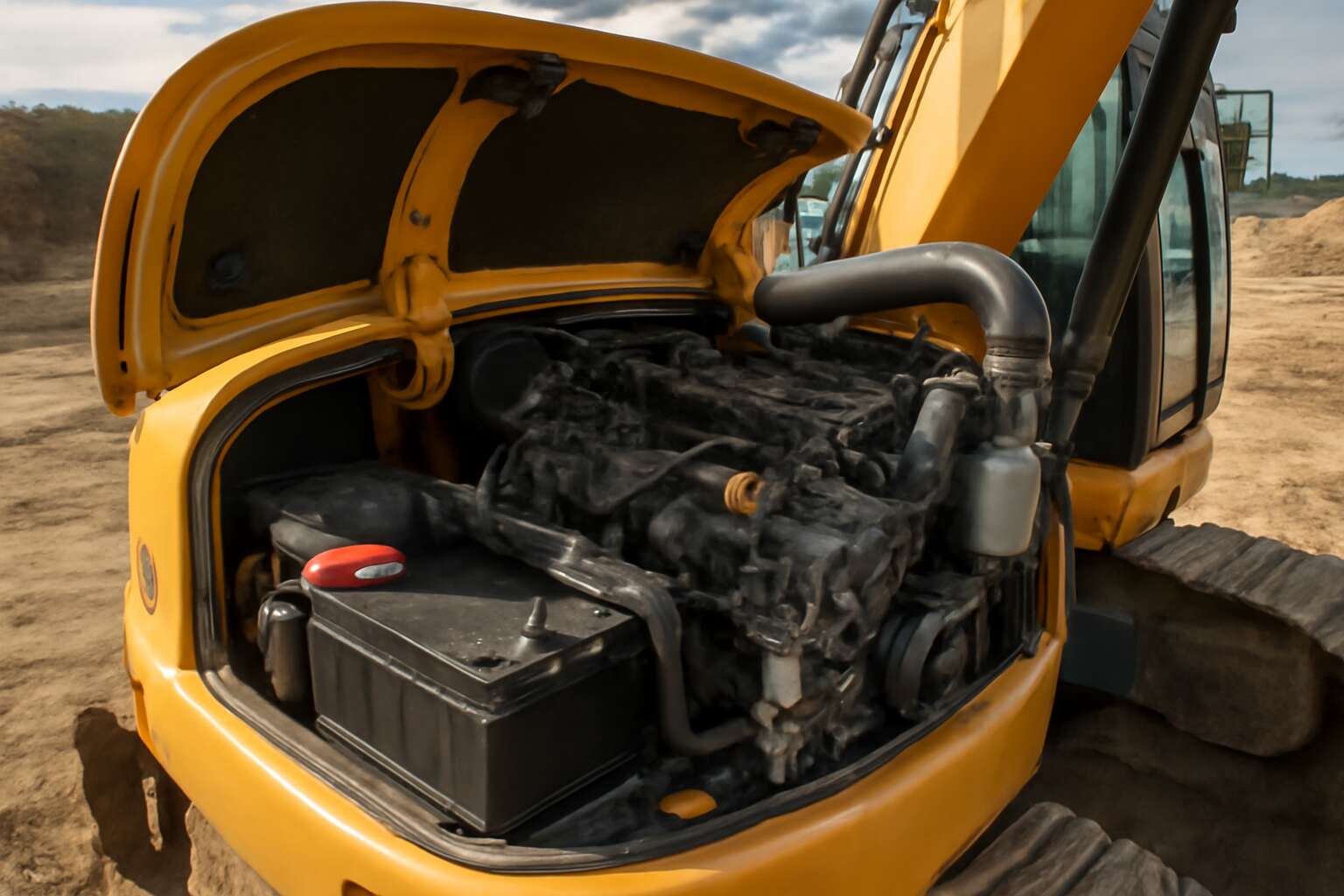Common Causes of Excavator Startup Problems
Battery Issues
One of the most insidious culprits behind an excavator refusing to spring to life is battery issues. It’s easy to overlook the silent whispers of a dying battery, yet it’s often the first sign that something’s amiss. When the battery is weak or failing, it can sap the power needed to ignite the engine, leaving you staring at a stubborn machine with no response. In South Africa’s demanding work environments, a compromised battery isn’t just inconvenient—it can halt entire projects.
If you’re pondering why is my excavator not starting, start by examining the battery’s health. Corrosion on terminals, loose connections, or an aged battery can all cause starting failures. Regular maintenance and checks can prevent these issues from turning into costly delays. Sometimes, the answer is simple—replacing a battery that has outlived its usefulness might be all that’s needed to get your excavator roaring back to life.
Fuel System Troubles
Fuel system troubles are a common culprit when your excavator refuses to start. Unlike battery issues, which often show quick signs, fuel problems can quietly sabotage your machine’s performance. If the fuel isn’t reaching the engine properly, your excavator simply won’t ignite. This can happen due to clogged fuel filters, contaminated fuel, or air trapped in the lines, disrupting the flow. In South Africa’s rugged environments, dirt and debris can easily infiltrate fuel tanks, leading to blockages that cause startup failures.
Addressing why is my excavator not starting often involves inspecting the fuel system thoroughly. Check for clogged filters or leaks in the fuel lines. Sometimes, it’s necessary to bleed the system to remove air pockets. In some cases, replacing old fuel or cleaning the tank can restore proper flow. When fuel delivery is compromised, the engine starves for the power it needs to turn over. Never underestimate how a simple clog or contamination can bring your project to a halt.
Electrical System Faults
In the realm of heavy machinery, electrical system faults often lurk like shadowy specters, ready to thwart your excavation endeavors. When the engine refuses to roar to life, a meticulous investigation of the electrical network can reveal hidden culprits. Corroded wiring, loose connections, or faulty sensors are common offenders that silently undermine startup attempts. These issues are especially insidious because they may not manifest through obvious symptoms, yet their impact is profound.
Electrical faults can stem from a variety of sources, but among the most prevalent are problems with the starter motor, alternator, or control relays. Over time, exposure to South Africa’s harsh environmental elements—dust, humidity, and temperature fluctuations—accelerates corrosion and wear on electrical components. An often overlooked aspect is the fuse box; a blown fuse can cut off power unexpectedly, leaving your excavator inert and unresponsive.
To diagnose why is my excavator not starting, inspecting the electrical system becomes an essential step. Look for signs of corrosion or burnt wiring. Testing the continuity of circuits and ensuring relays function correctly can prevent costly downtime. Remember, a well-maintained electrical system is the heartbeat of your machine; neglect it, and the machinery’s vigor wanes. When electrical faults are at play, even the most robust engine can become a stubborn, lifeless shell—until the root cause is uncovered and resolved.
Starter Motor and Solenoid Problems
When your excavator refuses to fire up, the culprit often hides behind the scenes—lurking in the starter motor and solenoid. These components are the unsung heroes of engine ignition, but they are also the most vulnerable to wear and tear. A faulty starter motor can become sluggish or jam, preventing the engine from turning over despite your best efforts. Similarly, problems with the solenoid—those tiny but vital switches—can block the electrical flow needed to energize the starter, leaving your machine dead in its tracks.
In South Africa’s rugged conditions, dust and moisture accelerate the deterioration of these crucial parts. Corrosion can seize the starter motor or cause the solenoid contacts to become pitted or burnt, halting the entire startup process. Symptoms often include a clicking sound or complete silence when turning the key, clues that point directly to starter or solenoid issues. Diagnosing the problem involves inspecting these components closely and testing their continuity—sometimes, a simple replacement restores the machine’s vigor. Remember, when troubleshooting why is my excavator not starting, don’t overlook the silent yet essential role of the starter motor and solenoid in your machine’s awakening.
Engine and Mechanical Failures
In the vast, unforgiving landscapes of South Africa, machinery failure isn’t just inconvenient—it can halt progress with brutal finality. When pondering “why is my excavator not starting,” one must peer beyond the obvious, into the intricate web of engine and mechanical failures that silently undermine the machine’s vitality. Often, internal components wear down quietly over time, leading to unpredictable breakdowns that catch operators off guard. The engine’s internal labyrinth—comprising worn piston rings, clogged filters, or degraded compression—can all conspire to prevent startup, leaving your equipment lifeless despite the effort.
Furthermore, mechanical failures rooted in the hydraulic system or transmission can also be culprits. For example, if hydraulic valves or control linkages become jammed or corroded, the engine may turn over, but the machine won’t engage. Sometimes, a simple inspection reveals issues like:
- Corroded or damaged connecting rods
- Degraded hydraulic seals causing internal leaks
- Worn gearboxes preventing proper engagement
Understanding these nuanced failures provides clarity when troubleshooting why is my excavator not starting and underscores the importance of thorough mechanical assessments in the field. After all, in South Africa’s rugged terrains, these hidden faults often hold the key to restoring your equipment’s operational rhythm.
Diagnostic Tips for Identifying the Root Cause
Visual Inspection Techniques
When your excavator refuses to roar to life, it’s easy to feel a wave of frustration washing over you. After all, these machines are the backbone of many rural South African farms, where every minute counts. Sometimes, the problem isn’t as obvious as a dead battery or fuel issues—it’s hidden in the intricate labyrinth of electrical connections or mechanical wear that’s gone unnoticed. Diagnosing why is my excavator not starting requires a keen eye and a methodical approach. Visual inspection techniques become invaluable here, allowing you to identify subtle signs of trouble that might otherwise be missed.
Start by thoroughly examining the cables, wiring harnesses, and connectors. Look for corrosion, frayed wires, or loose connections that could disrupt the flow of power. Check for any signs of oil leaks or worn belts that might hint at deeper mechanical issues. A good rule of thumb is to follow the electrical trail from the battery to the starter motor, ensuring no component is overlooked. Sometimes, a simple visual cue—a cracked hose or a burnt connector—can reveal why is my excavator not starting and point you toward the right repair before costly repairs escalate.
Listening for Sounds
Listening intently to your excavator’s symphony of sounds can unlock secrets hidden beneath its sturdy shell. When the engine refuses to purr to life, it often whispers clues through its acoustic cues—subtle clicks, hesitant cranks, or ominous whines. These auditory signals serve as the machine’s language, narrating tales of mechanical distress or electrical dissonance that might otherwise stay concealed. Tuning your ear to these nuances transforms routine troubleshooting into an art form, revealing the root cause behind the question: why is my excavator not starting?
Imagine standing beside your machine, and suddenly, a faint grinding noise emerges during attempted startup—this could point to a worn starter gear or a failing flywheel. Alternatively, a rapid clicking sound might indicate a weak solenoid or insufficient current reaching the starter. Recognizing these distinct sound signatures allows you to narrow down potential faults with precision. In the dense mechanical labyrinth of your excavator, auditory clues act as guiding stars, illuminating the path toward effective diagnosis and swift resolution.
- Pay close attention to the startup sounds—are they smooth or irregular?
- Note any unusual noises such as grinding, clicking, or whines.
- Correlate these sounds with visual inspection findings for a comprehensive diagnosis.
Using Diagnostic Tools
When faced with the perplexing question of why is my excavator not starting, harnessing diagnostic tools becomes an act of uncovering hidden truths beneath the machine’s formidable exterior. These instruments—oscilloscopes, multimeters, and pressure gauges—serve as the detective’s magnifying glass, revealing the clandestine whispers of electrical currents and mechanical pressures. With precision, you can trace the faintest pulse of life or the silent void where power should surge. It’s a symphony of signals waiting to be decoded, each flicker and fluctuation a clue in the intricate dance of machinery.
To elevate your diagnosis, consider employing a systematic approach: start by checking the voltage across critical components, then move to testing fuel pressure and flow. An ordered list of steps can help streamline your investigation:
- Inspect electrical connections for corrosion or looseness.
- Test fuel injectors and filters for obstructions or failure.
- Measure compression levels to identify internal engine distress.
By weaving these diagnostic techniques into your troubleshooting, you transform guesswork into clarity, illuminating the root cause of why is my excavator not starting with unwavering certainty. Each tool acts as a beacon in the darkness, guiding you toward a swift resolution and the roar of a ready machine once more.
Operational Checks
When faced with the perplexing question of why is my excavator not starting, a methodical operational check can illuminate the path forward. Sometimes, the issue isn’t immediately visible but lurking beneath the surface, waiting to be uncovered through keen observation. Starting with a simple yet vital step—listening for unusual sounds during attempted startup—can reveal insights about internal engine distress or mechanical blockages. These auditory clues often serve as the first sign that something isn’t quite right.
Next, evaluate the hydraulic system’s readiness. Insufficient hydraulic pressure or leaks can hinder engine startup, especially in complex machinery. An effective way to identify such issues is through a series of pressure tests, which help you gauge whether the hydraulics are performing within optimal ranges. Remember, a well-tuned hydraulic system is the heartbeat of your excavator, ensuring smooth operation and reliable starting performance.
- Check the condition of the spark plugs and ignition system, as faulty components here can prevent the engine from firing up.
- Inspect the fuel injection system for blockages or failures that might starve the engine of its vital fuel supply.
- Verify the integrity of sensors and switches—sometimes, a simple malfunction here can halt the entire starting process.
By weaving these operational checks into your troubleshooting routine, you can better understand why is my excavator not starting, turning a seemingly daunting task into a manageable puzzle. Each step guides you closer to uncovering the root cause, ensuring your machinery is ready to roar once again with confidence and precision.
Preventative Maintenance to Avoid Starting Issues
Regular Battery Maintenance
Within the realm of heavy machinery, even the most robust excavator can encounter moments of silence—leaving operators pondering, “why is my excavator not starting?” One often-overlooked safeguard against such frustrating episodes is diligent preventative maintenance. Regularly inspecting and caring for your excavator’s vital components can turn potential starting issues into distant echoes of the past, ensuring the machine awakens when needed most.
Preventative maintenance acts as a guardian, warding off the silent killers lurking within mechanical systems. Specifically, routine checks on the engine oil, coolant levels, and hydraulic fluid can reveal subtle signs of wear that might otherwise escalate into starting failures. Incorporating a scheduled maintenance routine—covering everything from filter replacements to tightening electrical connections—can significantly diminish the chances of encountering unexpected breakdowns.
Furthermore, a simple, yet often ignored, step is maintaining a clean, corrosion-free environment for your excavator’s electrical system. This not only prolongs the lifespan of delicate components but also ensures a smoother start every time. When you embrace this proactive approach, you preserve the vitality of your machinery, keeping it ready to perform and preventing issues that cause downtime and costly repairs.
Fuel System Maintenance
In the intricate dance of machinery and human effort, a silent question often echoes: why is my excavator not starting? When mechanical whispers fade into stillness, it’s a call for meticulous attention—an invitation to peer beneath the surface and uncover hidden vulnerabilities. One vital aspect that can turn a stubborn no-start into a smooth, roaring engine is preventative maintenance of the fuel system.
Fuel system maintenance isn’t merely about topping up tanks; it’s about safeguarding the very lifeblood of your excavator. Contaminated fuel, clogged filters, or airlocks can sabotage the starting process, rendering the machine uncooperative when you need it most. Regularly inspecting and replacing fuel filters, draining water separators, and ensuring fuel lines are clear can prevent these insidious issues from taking root.
- Check for water accumulation in fuel
- Replace filters at recommended intervals
- Inspect fuel lines for cracks or leaks
When these elements are neglected, they form a shadow cast over productivity, leaving operators pondering, “why is my excavator not starting?” Embracing diligent fuel system care transforms the task from a frustrating mystery into a manageable routine—preserving the machine’s vitality and readying it for the demanding days ahead.
Electrical System Upkeep
Electrical system upkeep is often the unsung hero—or villain—in the saga of “why is my excavator not starting?” While it’s tempting to blame the starter or battery first, the electrical network itself can be a labyrinth of subtle faults waiting to derail your day. Corrosion, loose wiring, or faulty switches may seem trivial, but they wield outsized influence over machine start-up success.
Regular electrical system inspection is essential. Check the wiring harnesses for wear and tear, and ensure that all connections are snug as a bug in a rug. Think of it as giving your machine a health check-up—because a healthy electrical system means fewer surprises when you turn the key. For added peace of mind, consider testing the voltage across critical points, which can reveal hidden gremlins lurking in the circuitry.
- Inspect all fuses and relays for signs of heat damage or corrosion.
- Verify the integrity of grounding points; a poor ground can cause starting woes.
- Test the wiring for continuity using a multimeter—no shortcuts here!
Embracing diligent electrical system maintenance not only prevents frustrating “why is my excavator not starting” moments but also extends the lifespan of your valuable machinery. When electrical gremlins are kept at bay, your excavator is more likely to roar to life at the crack of dawn, ready for whatever South Africa’s terrain throws at it.
Engine Care
Preventative maintenance is the silent guardian of reliable excavator operation, especially when facing the perplexing question, “why is my excavator not starting?” Regular engine care transforms routine checks into a fortress against unexpected failures. By routinely inspecting oil levels, coolant health, and filter conditions, operators can nip potential issues in the bud before they escalate into start-up nightmares.
Imagine your excavator as a living entity; it demands attentive nurturing. An often-overlooked aspect is the importance of maintaining proper timing and valve adjustments, which can influence engine performance and startup success. Additionally, keeping belts and hoses in pristine condition ensures the engine’s vital signs remain strong.
For those who seek peace of mind, a systematic approach using a diagnostic tool can unveil hidden faults. This proactive stance not only prevents the frustration of “why is my excavator not starting” but also safeguards your machinery’s longevity. Remember, consistent engine care isn’t just maintenance — it’s an investment in uninterrupted productivity on South Africa’s rugged terrain.
When to Seek Professional Help
Persistent Starting Problems
When your excavator refuses to ignite, it can feel like a sudden jolt of frustration in an otherwise seamless day on the site. If you’ve already checked the battery, fuel system, and electrical connections, yet the machine still won’t start, it may be time to seek professional help. Persistent starting problems often hint at deeper issues that aren’t immediately visible or audible. Ignoring these signs can lead to costly repairs or even complete breakdowns, disrupting your project’s momentum.
In cases where basic troubleshooting doesn’t resolve the issue, an experienced technician can perform advanced diagnostic tests to uncover hidden faults. Sometimes, the problem isn’t with the obvious components but with complex mechanical or electronic systems that require specialized knowledge. If your efforts to diagnose why is my excavator not starting have hit a dead end, reaching out to a certified service provider ensures that your equipment gets the precise attention it needs. Remember, timely professional intervention can save you both time and money in the long run.
Complex Electrical or Mechanical Failures
When the engine remains silent, whispering the secrets of an unseen malady, it’s often a sign that professional intervention is overdue. Complex electrical or mechanical failures don’t always announce themselves with obvious signs—they hide beneath the surface, lurking in the shadows of your excavator’s intricate systems. If your repeated attempts to diagnose why is my excavator not starting have yielded no answers, it’s time to summon the experts who can peer into the darkness with specialized diagnostic tools.
These failures are not merely inconveniences—they can threaten the very foundation of your project’s momentum. In some cases, it’s a silent electronic ghost in the machine, or a mechanical curse that only seasoned technicians can exorcise. When faced with such enigmatic failures, consider the following:
- Unexplained electrical glitches that defy simple troubleshooting
- Persistent mechanical irregularities that disrupt normal operation
- Failures that recur despite routine maintenance and checks
Reaching out to a professional ensures that the hidden, complex failures are uncovered and remedied before they spiral into catastrophic breakdowns. In the shadowed world of heavy machinery, only those with the keen eye and the right tools can truly diagnose why is my excavator not starting, saving you from the macabre cost of neglect.
Safety Concerns
Safety should always be the first priority when dealing with excavator starting issues. If your machine exhibits abnormal sounds, smoke, or irregular vibrations, it’s a red flag. Ignoring these signs can lead to serious accidents or costly damage. When your excavator won’t start and safety concerns arise, it’s time to step back and call in the experts. Don’t risk injury or further damage by attempting complex repairs without proper training or equipment.
Recognizing when to seek professional help is crucial. If you notice persistent electrical issues, strange noises, or unexplained fluid leaks, these are signals that the problem may be more complex than a simple fix. In such cases, a qualified technician with the right diagnostic tools can assess the situation thoroughly. Remember, unresolved safety concerns can escalate quickly, jeopardizing both personnel and project timelines.
- Unusual engine behavior or warning lights on the panel
- Repeated failure to start despite basic troubleshooting
- Any visible damage or fluid leakage near critical components
Addressing why is my excavator not starting promptly with professional help ensures safety and prevents minor issues from turning into major breakdowns. Trust expert diagnosis to keep your operation running smoothly and safely.




0 Comments